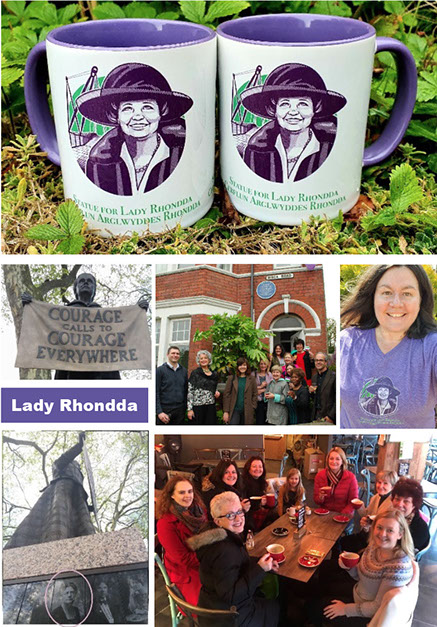
Meet the Famous Five
Monumental Welsh Women
 Julie Nicholas, Chair of the Statue for Lady Rhondda steering group, introduces the campaign for Gwent’s first statue of a named woman.
Julie Nicholas, Chair of the Statue for Lady Rhondda steering group, introduces the campaign for Gwent’s first statue of a named woman.
Until the 29th September 2021 there were no statues of named women in Wales. The triumphant unveiling of Betty Campbell’s monument in Cardiff was the first piece of public art celebrating the contribution, success and leadership of a named woman in this country.
In Newport there are more statues of farmyard animals than named women, and the female sculptures we do have are not only unnamed but generally unclothed (yes, that’s you Union, Prudence & Energy). The Monumental Welsh Women campaign aims to change that with 5 statues of 5 famous, diverse and inspiring Welsh women in the next 5 years. Newport Suffragette Lady Rhondda was chosen as the woman of Gwent, to join campaigner Elizabeth Andrews, poetess Cranogwen, writer Elaine Morgan and teacher Betty Campbell to make up the Famous Five.
If you have never heard of Lady Rhondda, there is a reason for that; great women are all too easily ignored and forgotten, refused entry to the political and historical canon. However, if we want to inspire the next generation we must begin to reclaim and tell the full narrative of our past.
Just as we need to talk about who we have chosen to celebrate in the civic space, we need to address the huge gaps in our public landscape; including the women and those from other minority groups who have played important parts in our national story.
This is why the unveiling of the Betty Campbell monument last month was so special to so many people, and of course it helped that Eve Shepherd’s sculpture was so beautiful, intricate and powerful.
Lady Rhondda was previously featured at the 2013 Chartist Convention when Professor Angela V John introduced her seminal biography Turning the Tide.
Margaret Haig Thomas, Lady Rhondda who became Margaret Haig Mackworth, Viscountess Rhondda led many extraordinary lives as a businesswoman, campaigner, survivor, editor and stateswoman. She dedicated her life and her fortune to feminist causes and women’s rights; and she started that activism at Llanwern House.
As a young woman she founded the Newport branch of the Women’s Social and Political Union, selling copies of The Suffragette from the town’s gutters, before running an international business empire. Lady Rhondda set up the important inter-war periodical Time & Tide where she launched The Six Point Group, a Women’s Charter for the twentieth century, echoing the six points of the People’s Charter almost a century before.
She continued to lead and inspire the feminist movement for the rest of her life, right up to her final battle, the campaign for women to be admitted to the House of Lords, a battle finally won in 1958, only weeks after Lady Rhondda’s death.
Today her image is found both inside and outside the Westminster palace that refused Lady Rhondda her seat; her portrait hangs in the House of Lords’ dining room, and she can also be found on the pedestal of the Millicent Fawcett statue unveiled in 2018 in Parliament Square.
It is now time to celebrate Lady Rhondda at home. We unveiled a Blue Plaque in 2015. Recognising the need to do more to publicly reclaim Lady Rhondda, the Statue for Lady Rhondda steering group was founded in 2019.
Just as everyone in Newport knows exactly who our rebel son John Frost is, we want the same local and national recognition for our rebel daughter, Margaret Haig Mackworth.
A Statue for Lady Rhondda will help us to achieve that. Join in - WE CAN DO IT!
To donate to the Statue for Lady Rhondda crowdfunder visit: https://uk.gofundme.com/f/statue-for-lady-rhondda
To join the mailing list & keep updated on the campaign email statueforladyrhondda@gmail.com.
To find out about the Monumental Welsh Women campaign visit https://monumentalwelshwomen.com/
Statue for Lady Rhondda will have a stand at the 2021 Chartist Convention- come and say hello!









